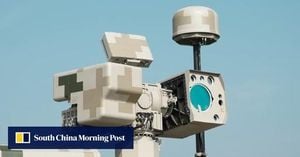Mark Zuckerberg, the head of Meta, recently dined with Donald Trump at his Mar-a-Lago estate, signaling what some are calling a thawing of their previously icy relations. The two influential figures met on the eve of Thanksgiving, which has led to speculation about the future dynamics between the tech world and Trump’s political ambitions.
Not too long ago, their relationship was fraught with tension. Following the events of January 6, 2021, Trump faced bans from both Facebook and Instagram due to his role during the Capitol riots. At the time, Meta deemed Trump’s continued presence as dangerous and decided to remove him from their platforms.
Despite these past grievances, it appears both parties have shown signs of wanting to move forward. A Meta spokesperson shared insights after the recent dinner, stating, "Mark was grateful for the invitation to join President Trump for dinner and the opportunity to meet with members of his team about the incoming administration." They also recognized the importance of the time for American innovation. The mood seems markedly different from previous times when Trump controversially claimed Zuckerberg could spend his life behind bars if he interfered with the upcoming election.
Interestingly, Trump's posture has shifted too; he noted on several occasions now how he appreciates Zuckerberg's decision to "stay out" of the 2024 election. Recognizing this softer tone, Zuckerberg seems to have seized the opportunity to repair their relationship. Just months earlier, the two were hardened adversaries, with Trump accusing Zuckerberg of plotting against him during the electoral process.
By August 2023, amid media chatter about the upcoming elections, Zuckerberg expressed regrets over certain Meta actions, particularly how they influenced conversations around Hunter Biden’s business. This reflects his broader aim to appear as neutral and genuinely concerned about fair electoral practices. He indicated he would not be making contributions to electoral infrastructure following his previous $400 million donation seen by some as advantageous to Democrats.
During their latest dinner, specifics of discussions remain unclear, but the backdrop of increasing regulatory scrutiny underlined the meeting. Meta continues to operate under the shadow of the FTC’s antitrust investigations. Trump, having cultivated close ties with other tech personalities like Elon Musk, who are also facing their own scrutiny and challenges, adds to the spotlight on Zuckerberg’s relationship management.
While the dinner was amicable, it wasn’t without its history. Trump previously framed Zuckerberg as part of the establishment eager to stifle conservative voices online. He has made waves over the years, even expressing disappointment toward the suspension of his accounts. Yet the tides have turned, with Trump now seeming to soften his stance and publicly speak about how he finds Zuckerberg more likable these days.
Also, the backdrop of Zuckerberg’s praise for Trump’s response to his near-fatal shooting earlier this year is noteworthy. Zuckerberg commented on Trump’s determination, highlighting how such assertiveness resonates with the American spirit and would likely evoke strong feelings from many supporters. This anecdote has brought contending narratives together, portraying Trump as resilient even under physical threat.
Despite their recent camaraderie, there remain unanswered questions about what their interactions will mean for the tech industry and regulatory landscapes. Republican dialog surrounding Zuckerberg and Meta is complex, as the GOP largely seems to maintain resentment toward the donations and decisions made during the previous election cycles.
Interestingly, political analysts have noted the dynamics at play as the negotiation space opens for Zuckerberg. The fact is, both tech giants and political heavyweights have little choice but to find common ground moving forward, especially as the 2024 election looms closer.
Newt Gingrich, former Speaker of the House, recently endorsed this union, likening Trump to mythic figures, claiming he exists outside conventional politics, and indicating this transition is emblematic of broader cultural changes. This tune is echoed as industry personalities gradually gravitate back toward Trump, trying to influence or anticipate shifts under his potential governance.
The dinner at Mar-a-Lago stands as another example of tech leaders recalibrated their strategy and relationships with political structures. Trump’s past and present threats about Zuckerberg, particularly those surrounding election fraud and social media oversight, highlight just how dynamic and shifting their interactions could remain.
While this latest meetup has generated discourse, it also begs the question of how the intersectionality of technology, social media, and electoral politics will evolve as neither party appears willing to walk back entirely from areas of intense contention. The tension and release of the past come together at this pivotal moment as both Zuckerberg and Trump navigate the choppy waters of American political and social landscapes together.
The crux lies within the regulatory framework as Meta prepares to tackle potential ramifications from both public sentiment and government scrutiny. With several rounds of conversations taking place, the relationship between social media giants and political leaders will undeniably influence future discussions as elections approach.
Now more than ever, the nuances of these relationships will be exposed, warranting observation as Trump dissects the possibility of holding Zuckerberg accountable amid criticisms of his tech-driven donation strategies. It remains to be seen how their shared meal will translate to more substantial interactions as the political stages begin to set themselves for what could be America’s most fraught electoral year.



